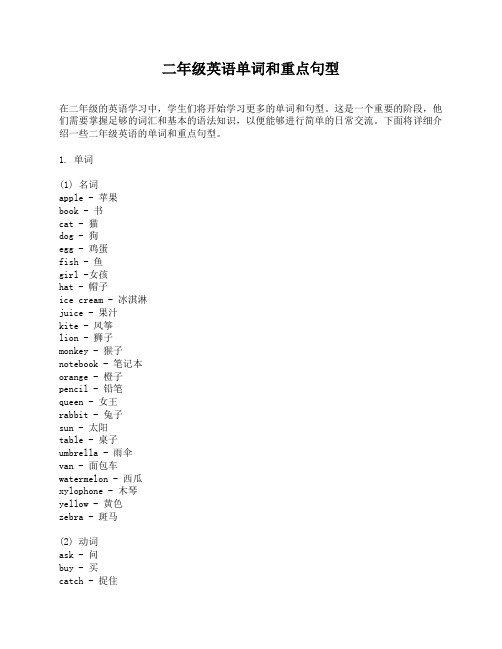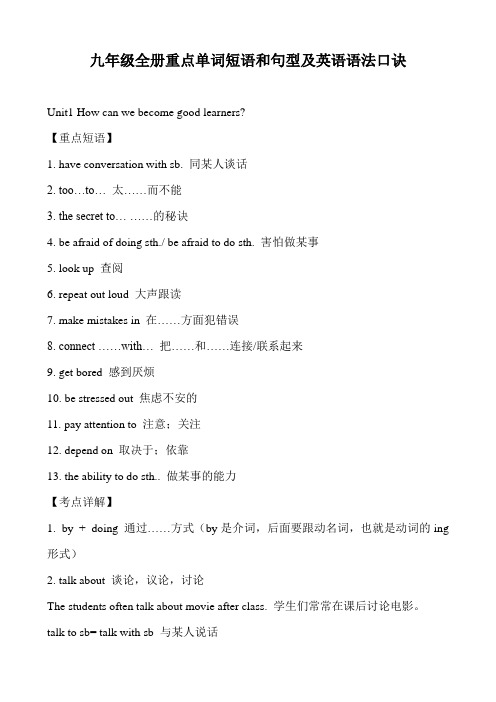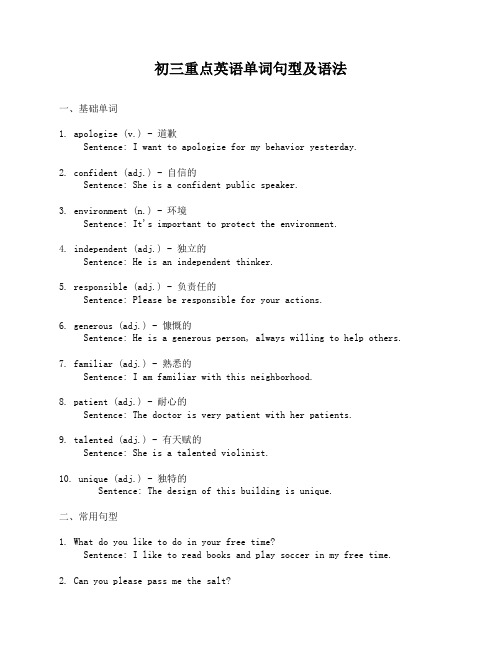英语单词语法和重点句型
二年级英语单词和重点句型

二年级英语单词和重点句型在二年级的英语学习中,学生们将开始学习更多的单词和句型。
这是一个重要的阶段,他们需要掌握足够的词汇和基本的语法知识,以便能够进行简单的日常交流。
下面将详细介绍一些二年级英语的单词和重点句型。
1. 单词(1) 名词apple - 苹果book - 书cat - 猫dog - 狗egg - 鸡蛋fish - 鱼girl -女孩hat - 帽子ice cream - 冰淇淋juice - 果汁kite - 风筝lion - 狮子monkey - 猴子notebook - 笔记本orange - 橙子pencil - 铅笔queen - 女王rabbit - 兔子sun - 太阳table - 桌子umbrella - 雨伞van - 面包车watermelon - 西瓜xylophone - 木琴yellow - 黄色zebra - 斑马(2) 动词ask - 问buy - 买catch - 捉住dance - 跳舞eat - 吃fly - 飞give - 给have - 有jump - 跳跃kick - 踢laugh - 笑make - 制作nurse - 护士open - 打开paint - 画run - 跑sing - 唱歌take - 拿understand - 理解visit - 参观walk - 走yell - 喊叫zip - 拉上拉链(3) 形容词big - 大的cold - 冷的fast - 快的happy - 快乐的long - 长的nice - 好的old - 老的quick - 快速的small - 小的tall - 高的young - 年轻的2. 句型(1) 问候语Hello! - 你好!Good morning! - 早上好!Good afternoon! - 下午好!Good evening! - 晚上好!How are you? - 你好吗?I'm fine, thank you. - 我很好,谢谢。
九年级全册重点单词短语和句型及英语语法口诀

九年级全册重点单词短语和句型及英语语法口诀Unit1 How can we become good learners?【重点短语】1. have conversation with sb. 同某人谈话2. too…to… 太……而不能3. the secret to… ……的秘诀4. be afraid of doing sth./ be afraid to do sth. 害怕做某事5. look up 查阅6. repeat out loud 大声跟读7. make mistakes in 在……方面犯错误8. connect ……with… 把……和……连接/联系起来9. get bored 感到厌烦10. be stressed out 焦虑不安的11. pay attention to 注意;关注12. depend on 取决于;依靠13. the ability to do sth.. 做某事的能力【考点详解】1. by + doing 通过……方式(by是介词,后面要跟动名词,也就是动词的ing 形式)2. talk about 谈论,议论,讨论The students often talk about movie after class. 学生们常常在课后讨论电影。
talk to sb= talk with sb 与某人说话3. 提建议的句子:①What/ how about +doing sth.? 做…怎么样?(about后面要用动词的ing形式,这一点考试考的比较多)如:What/ How about going shopping?②Why don't you + do sth.? 你为什么不做…?如:Why don't you go shopping?③Why not + do sth. ? 为什么不做…?如:Why not go shopping?④Let's + do sth. 让我们做…...吧。
初三重点英语单词句型及语法

初三重点英语单词句型及语法一、基础单词1. apologize (v.) - 道歉Sentence: I want to apologize for my behavior yesterday.2. confident (adj.) - 自信的Sentence: She is a confident public speaker.3. environment (n.) - 环境Sentence: It's important to protect the environment.4. independent (adj.) - 独立的Sentence: He is an independent thinker.5. responsible (adj.) - 负责任的Sentence: Please be responsible for your actions.6. generous (adj.) - 慷慨的Sentence: He is a generous person, always willing to help others.7. familiar (adj.) - 熟悉的Sentence: I am familiar with this neighborhood.8. patient (adj.) - 耐心的Sentence: The doctor is very patient with her patients.9. talented (adj.) - 有天赋的Sentence: She is a talented violinist.10. unique (adj.) - 独特的Sentence: The design of this building is unique.二、常用句型1. What do you like to do in your free time?Sentence: I like to read books and play soccer in my free time.2. Can you please pass me the salt?Sentence: Sure, here you go.3. I'm sorry, but I can't attend the party tonight.Sentence: That's okay, maybe next time.4. How was your weekend?Sentence: My weekend was great, I went hiking with my family.5. Could you please help me with my homework?Sentence: Of course, I would be happy to help.6. What time does the movie start?Sentence: The movie starts at 7:30 PM.7. Where is the nearest bus stop?Sentence: The nearest bus stop is just around the corner.8. I'm really excited about the school trip next week.Sentence: Me too, it's going to be a lot of fun.9. What do you want to be when you grow up?Sentence: I want to be a doctor and help people.10. How do you spell your name?Sentence: My name is spelled J-O-H-N.三、语法1. Present Simple Tense (一般现在时)- 表示经常发生的动作或事实。
初中英语所有重要的语法规则、句型

初中英语所有重要的语法规则、句型
1. 时态
- 一般现在时:表示经常性或普遍性动作,或者事实、真理等。
- 一般过去时:表示过去某个时间发生的动作或情况。
- 一般将来时:表示将要发生的动作或情况。
2. 现在进行时
- 表示正在进行的动作。
- 结构:be动词(am, is, are)+ 现在分词。
3. 一般过去时
- 表示过去某个时间发生的动作或情况。
- 结构:动词的过去式。
4. 情态动词
- 表示能力、可能性、必要性等。
- 常见的情态动词有:can, could, may, might, must, will, would, should。
5. 被动语态
- 表示动作的承受者在句中作主语。
- 结构:be动词 + 过去分词。
6. 感叹句
- 用来表达惊讶、赞美、喜悦等强烈感情。
- 结构:How + adj./adv. + 主语 + 动词!
7. 条件句
- 表示某种条件下可能发生的情况。
- 结构:if + 条件从句,主句。
8. 祈使句
- 用于表示命令、请求、建议等。
- 结构:动词原形 + ...
9. 疑问句
- 用于提问。
- 一般疑问句结构:助动词/情态动词 + 主语 + 动词原形?
10. 介词
- 用于表示关系、位置、方向等。
- 常见的介词有:in, on, at, for, with, to, from, before, after, etc.
以上是初中英语中的一些重要的语法规则和句型,希望对你有帮助!。
英语七上重点词汇 单词 语法句型

英语七上重点词汇单词语法句型英语七年级上册的重点词汇主要是初中英语词汇的基础,也是基础性词汇。
下面将分别介绍一下这些单词的意义,以及常用语法句型。
一、单词1. family:家庭2. sister:姐妹3. brother:兄弟4. mother:母亲5. father:父亲6. aunt:姑妈/舅妈7. uncle:叔叔/舅舅8. grandmother:外婆/祖母9. grandfather:外公/祖父10. cousin:表兄弟姐妹11. friend:朋友12. classmate:同学13. teacher:老师14. student:学生15. school:学校16. book:书17. pen:笔18. pencil:铅笔19. eraser:橡皮20. ruler:尺子21. ballpoint pen:圆珠笔22. desk:书桌23. chair:椅子24. blackboard:黑板25. classroom:教室二、语法句型1. 一般现在时一般现在时表示一个经常发生的动作或状态。
规则动词加 s/es 后缀,I/we/you/they/he/she/it 都一样。
例如:She often walks to school.(她经常步行去学校。
)I like playing basketball.(我喜欢打篮球。
)2. 数量词数量词用于表示数量,如数目、重量、尺寸等。
例如:I have two books.(我有两本书。
)She weighs 45 kg.(她体重45公斤。
)3. 形容词的比较级比较级用于比较两个或两个以上的人或物之间的差异。
通常在形容词前加 er。
例如:My sister is taller than me.(我姐姐比我高。
)This pen is longer than that one.(这支笔比那支长。
)4. 情态动词 can 和can’tcan 表示“能够”、“会”、“可以”;can’t 表示“不能”。
2024 人教版七年级英语上册知识点

2024人教版七年级英语上册知识点1.Starter Unit1Good morning!(1)重点短语:∙Good morning!(早上好!)∙Good afternoon!(下午好!)∙Good evening!(晚上好!)∙How are you?(你好吗?)∙I'm fine,thanks.(我很好,谢谢。
)(2)例句:∙Good morning,Miss Li!(早上好,李老师!)∙Good afternoon!Nice to see you.(下午好!很高兴见到你。
)∙Good evening!What are you doing?(晚上好!你在做什么?)∙How are you today?(你今天怎么样?)∙I'm fine,thanks.And you?(我很好,谢谢。
你呢?)(3)重点语法:∙字母的读音和书写:掌握26个英文字母的大小写形式、读音及基本书写规范,这是学习英语的基础。
∙音标基础:初步接触一些简单的音标,为后续学习单词的正确发音做准备,比如元音音标/æ/、/e/、/ɪ/等和一些简单的辅音音标/p/、/b/、/t/等。
∙Be动词的简单用法:学习Be动词am、is、are的最基本用法。
在这个单元中,主要让学生了解I搭配am,you搭配are,这是最基础的Be动词搭配形式。
2.Starter Unit2What's this in English?:(1)重点单词:map(地图)cup(杯子)ruler(尺子)pen(钢笔)orange(橙子)jacket(夹克衫)key(钥匙)quilt(被子)what(什么)in(在……里)English(英语;英文)。
(2)重点短语:∙询问物品:What's this in English?(这个用英语怎么说?)、What's that inEnglish?(那个用英语怎么说?)∙回答方式:It's a/an...(它是一个……)。
人教版高中英语(必修3)重点词汇、短语、句型、语法全汇总
人教版高中英语(必修3)重点词汇、短语、句型、语法全汇总Unit1 Festivals around the world重点词汇1.take place 发生2.religious 宗教的3.in memory of 纪念4.belief 信任,信心,信仰5.dress up 盛装,打扮6.trick 诡计,窍门7.play a trick on 搞恶作剧,诈骗8.gain 获得9.gather 搜集,集合10.award 奖品,授予11.admire 赞美,钦佩12.look forward to 期望,盼望13.day and night 日夜14.as though 好像15.have fun with 玩的开心16.permission 许可,允许17.turn up 出现,到场18.keep one's word 守信用19.hold one's breath 屏息20.apologize道歉21.obvious 显然的22.set off 出发,动身,使爆炸重点短语1.mean doing sth. 意味着mean to do sth. 打算或企图做某事mean sb. to do sth. 打算让某人做某事be meant for 打算作……用; 为…而有2.take place 发生;举行3.of all kinds 各种各样的4.starve to death 饿死be starved of 缺乏starve for sth, starve to do 渴望5.plenty of 大量; 充足6.be satisfied with对......感到满意to one's satisfaction令某人感到满意7.do harm to sb.=do sb. harm 伤害某人8.in the shape of 呈…的形状,以…的形式9.in memory of/ to the memory of sb.纪念某人10.dress up 穿上最好的衣服;打扮,化装11.award sth.(to sb.)和award sb.sth.(for sth.) 颁奖reward sb. for sth. 因…奖赏某人reward sb. with sth. 用某物酬劳某人12.admire sb. for sth在某方面钦佩某人13.look forward to期望,期待,盼望14.have fun with(与某人)玩得开心;过得快乐( have a good time;enjoy oneself.)15. turn up 出现;调大/高turn down 拒绝;调小/低turn off 关掉turn on 打开turn out 结果是......turn to sb. for help 向某人求助16.keep one's word 守信用break one's word, 失信17.It be obvious that-clause显而易见;一目了然18.set off 出发; 使(地雷、炸弹)爆炸set in 开始set up 建立,创立set out to do = set about doing sth. 着手做set down 写下,记下19.remind sb. of sth. 提醒,使想起重点句型1.Please make sure when and where the accident took place.请查清楚事故是何时何地发生的。
人教版英语七年级下册unit1+2核心考点归纳(语法+词汇+短语+重点句子)
人教版七年级下册unit1+2核心考点及语法归纳【unit 1语法】一、情态动词can的基本用法情态动词can有一定的词义,但不能独立存在,它必须与动词原形一起构成谓语。
can没有人称和数的变化。
其具体用法如下:1.表示"能、会",指脑力或体力方面的"能力"。
例如:I can speak English.我会讲英语。
Jim can swim but I can't.吉姆会游泳,但我不会。
2.表示"可能",常用于否定句或疑问句中,指某种可能性。
例如:Han Mei can't be in the classroom.韩梅不可能在教室里。
Can he come here today, please?请问他今天能到这里来吗?3.表示"可以",常用于口语中,指许可或请求做某事。
例如:Can I have a cup of tea, please?请问我可以喝一杯茶吗?You can go out.你可以出去了?二、情态动词的注意事项1. can的口诀:情态动词can、can、can,动词原形跟后面。
变疑问can提前,变否定not后面加上去。
主语人称单复数,情态动词不能变。
2. 情态动词can可以引导肯定句和疑问句。
肯定句:主语+ can + 动词原形+ 其他成分疑问句:can + 主语+ 动词原形+ 其他成分3.can 引导的肯定句变为疑问句的方法:(一调二改三问号)can 提前,首字母大写。
(一调)肯定句中主语在变成疑问句时的变化。
(二改)如:肯定句:You can feed the animals.你可以喂动物。
疑问句:Can I feed the animals?我能喂动物吗?在句尾后面加问号。
(三问号)4. Can的一般疑问句回答:肯定回答:Yes,主语(必须人称代词)+ can.否定回答:No,主语(必须人称代词)+ can not (can’t)/mustn’t. Yes 或no 后要使用逗号,除了I 以外,其他人称都要小写。
【人教】七年级上册英语重点单词、短语、语法
七年级英语上册重点单词、短语、语法Unit 1★重点单词、短语1. 名字name2. 令人愉快的nice3. 相逢meet4. 你的;你们的your5. 他的his6. 和;又;而and7. 她的her8. 不是not9. 是的;可以yes10. 他he11. 你;你们you12. 她she13. 电话号码phone number14. 第一first15. 最后的;末尾的last16. 朋友friend17. 中国China18. 中间的middle19. 学校school★重点语法人称代词主格和形容词性物主代词【比武大擂台】1. I am a girl. 我是一个女孩。
2. He/She is my friend. 他/她是我的朋友。
3. You are very nice. 你非常好。
4. It is a bed. 它是一张床。
5. My name is Mary. 我的名字叫玛丽。
6. Your room is so tidy. 你的房间很整洁。
7. This is his/her pen. 这是他/她的钢笔。
8. That is my dog. Its name is Susan.那是我的狗。
它的名字叫苏珊。
【各显神通】人称代词主格一般放在句首,在句中作主语,如例句1、2、3、4。
I 作主语时,be 动词用am;she/he/it 作主语时,be动词用is。
形容词性物主代词不能单独使用,其后必须跟名词,如例句5、6、7、8。
Unit 2★重点单词、短语1. 姐;妹sister2. 兄;弟brother3. 妈妈mother4. 爸爸father5.(外)祖父母grandparents6. 我的家人my family7. 你的父母your parents8. 过得愉快have a good day9. 这/那是……This/That is ...10. 这些/那些是……These/Those are ...11. 见到你很高兴。
人教版高中英语必修3重点词汇、短语、句型、语法大全
Unitl Festivals around the world【重点词汇.短语】take place 发生1.religious 宗教的in memory of 纪念2.belief信任,信心,信仰dress up盛装,打扮3.trick诡计,窍门play a trick on搞恶作剧,诈骗4.gain获得gather■搜集,集合5.award奖品,授予admire赞美,钦佩6.look forward to 期望,盼望day and night 日夜7.as though 好像have fun with 玩的开心8.permission 许可,允许turn up出现,到场9.keep one' s word 守信用hold one' s breath 屏息10.apologize 道歉obvious 显然的6.After the rain, we went ahead with our work.雨停之后,我们继续工作。
7.And it was the ship that brought you to England.正是那艘船把你带到了英国。
8.I earned my passage by working as an unpaid hand, which accounted for my appearance. 我是作为一个不拿工资的帮手赚来我的船费,这就是我为什么会衣冠不整的原因了。
9.Dick found himself walking in the direction of the church.迪克发现自己不知不觉朝教堂方向走去。
10.Even if/though he is very nice, I don' t trust him.即使他很好,我也不太相信他。
【语法总结】名词性从句在句子中起名词作用的句子叫名词性从句(Noun Clauses),名词性从句的功能相当于名词词组,它在复合句中能担任主语、宾语、表语、同位语等,因此根据它在句中不同的语法功能,名词性从句又可分别称为主语从句、宾语从句、表语从句和同位语从句。
